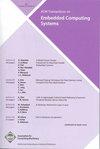Scheduling Dynamic Software Updates in Mobile Robots
IF 2.8
3区 计算机科学
Q2 COMPUTER SCIENCE, HARDWARE & ARCHITECTURE
引用次数: 0
Abstract
We present NeRTA ( Ne xt R elease T ime A nalysis), a technique to enable dynamic software updates for low-level control software of mobile robots. Dynamic software updates enable software correction and evolution during system operation. In mobile robotics, they are crucial to resolve software defects without interrupting system operation or to enable on-the-fly extensions. Low-level control software for mobile robots, however, is time sensitive and runs on resource-constrained hardware with no operating system support. To minimize the impact of the update process, NeRTA safely schedules updates during times when the computing unit would otherwise be idle. It does so by utilizing information from the existing scheduling algorithm without impacting its operation. As such, NeRTA works orthogonal to the existing scheduler, retaining the existing platform-specific optimizations and fine-tuning, and may simply operate as a plug-in component. To enable larger dynamic updates, we further conceive an additional mechanism called bounded reactive control and apply mixed criticality concepts. The former cautiously reduces the overall control frequency, whereas the latter excludes less critical tasks from NeRTA processing. Their use increases the available idle times. We combine real-world experiments on embedded hardware with simulations to evaluate NeRTA. Our experimental evaluation shows that the difference between NeRTA’s estimated idle times and the measured idle times is less than 15% in more than three-quarters of the samples. The combined effect of bounded reactive control and mixed-criticality concepts results in a 150+% increase in available idle times. We also show that the processing overhead of NeRTA and of the additional mechanisms is essentially negligible.移动机器人动态软件更新调度
我们提出了NeRTA (nenext R release time A analysis),这是一种能够对移动机器人的底层控制软件进行动态软件更新的技术。动态软件更新使软件在系统运行过程中得以修正和演进。在移动机器人中,它们对于解决软件缺陷而不中断系统运行或实现动态扩展至关重要。然而,用于移动机器人的低级控制软件是时间敏感的,并且运行在没有操作系统支持的资源受限的硬件上。为了尽量减少更新过程的影响,NeRTA在计算单元空闲时安全地安排更新。它通过利用现有调度算法中的信息而不影响其操作来实现这一目标。因此,NeRTA与现有的调度器是正交的,保留了现有的特定于平台的优化和微调,并且可以简单地作为插件组件操作。为了实现更大的动态更新,我们进一步构思了一种称为有界反应控制的附加机制,并应用了混合临界概念。前者谨慎地减少总体控制频率,而后者则从NeRTA处理中排除不太关键的任务。它们的使用增加了可用的空闲时间。我们将嵌入式硬件上的真实实验与模拟相结合来评估NeRTA。我们的实验评估表明,在超过四分之三的样本中,NeRTA估计的空闲时间与测量的空闲时间之间的差异小于15%。有界反应控制和混合临界概念的综合作用使可用空闲时间增加了150%以上。我们还表明,NeRTA和附加机制的处理开销基本上可以忽略不计。
本文章由计算机程序翻译,如有差异,请以英文原文为准。
求助全文
约1分钟内获得全文
求助全文
来源期刊

ACM Transactions on Embedded Computing Systems
工程技术-计算机:软件工程
CiteScore
3.70
自引率
0.00%
发文量
138
审稿时长
6 months
期刊介绍:
The design of embedded computing systems, both the software and hardware, increasingly relies on sophisticated algorithms, analytical models, and methodologies. ACM Transactions on Embedded Computing Systems (TECS) aims to present the leading work relating to the analysis, design, behavior, and experience with embedded computing systems.
 求助内容:
求助内容: 应助结果提醒方式:
应助结果提醒方式:


